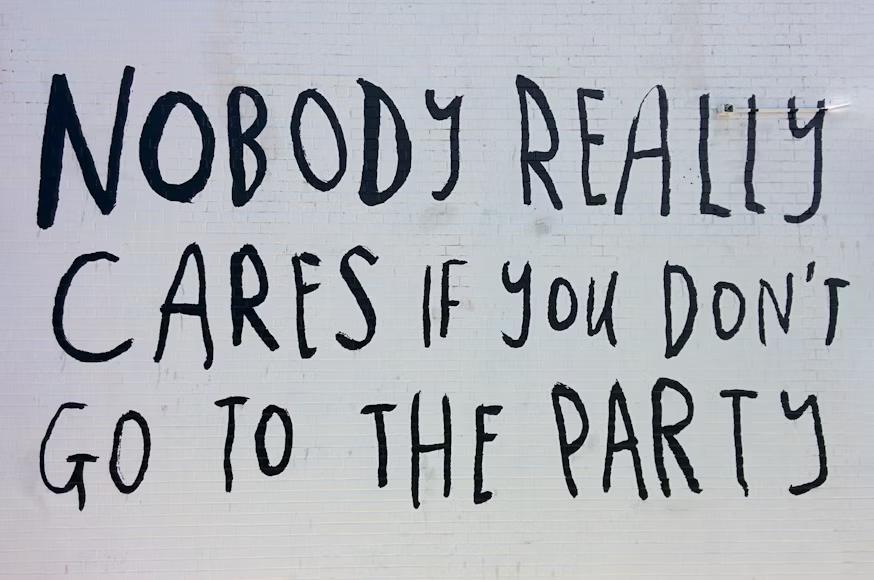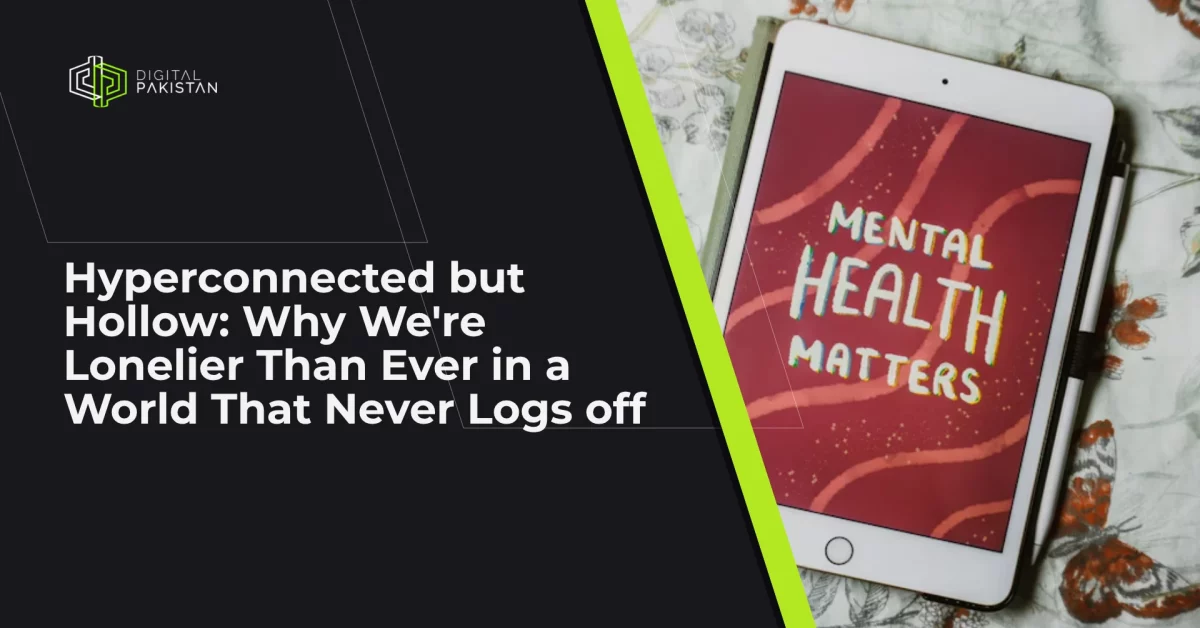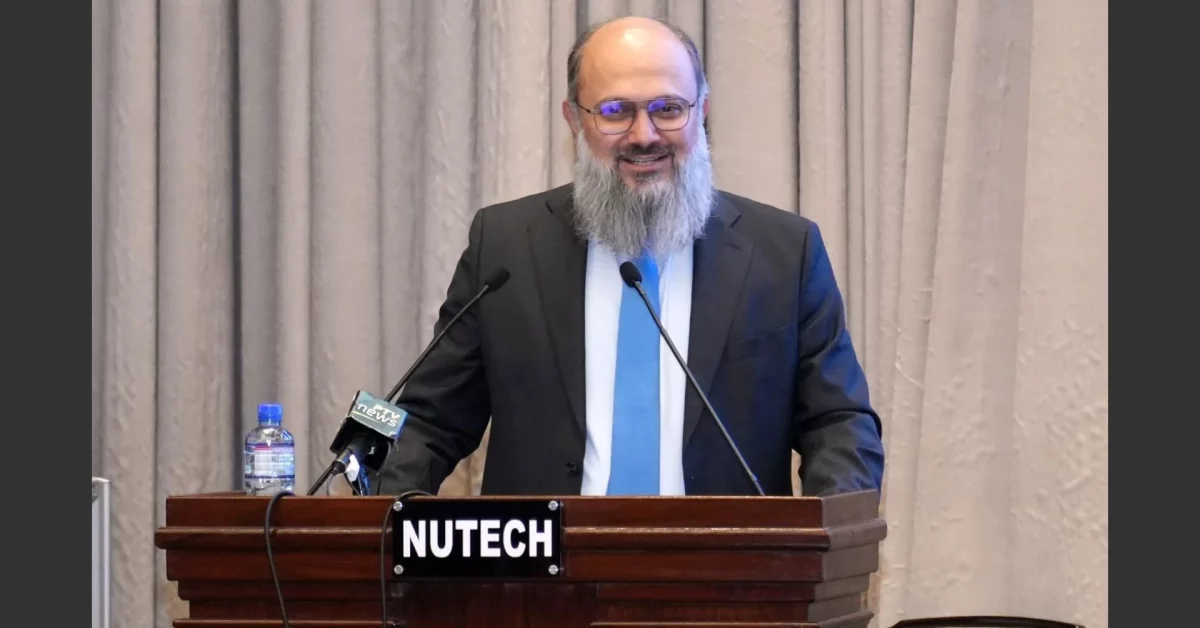
MindHYVE.ai Partners with Pakistan Government
October 9, 2025
Pakistan and Citi Launch Sovereign Sustainability Framework
October 10, 2025Oblivion and Loneliness in The Age of Hyperconnectivity
Introduction: Hyperconnected and Isolated
Living in an era of hyperconnectivity and enmeshed in algorithmic reality, in its own way can be a very isolating experience. Despite the fact that we’re chronically online and constantly immersed in the deluge of information, our realities are fractured into disorienting fragments. We’re more dissociated from ourselves and polarized in how we perceive the world around us than ever before.
Eventually, it can get to a point of severe desensitization and disenchantment. We’re connected to each other, but rarely, if ever, are these connections truly meaningful and long-lasting. The increasing alienation and dissociation has become the source of the crises of purpose and deep melancholy presenting in our youth.
In the curated superficiality and increasing disintegration of reality, which shifts faster with each newfangled trend, we no longer find the need to actually take the time to reflect upon the consequences of how we impact the lives of those with whom we share the virtual and physical spaces.
Wrapped and forged in layers of outward personae, toiling too self-indulgently to match the demands of the era, we’re endangered by the possibility of losing sight of who we are, who we’ve become and what we really stand for. Lost in the lostness of 21st century existence bears a heavy cost on our youth’s mental and physical health.
When Mental Health Pays the Cost
Excessive exposure to misinformation and unsafe presence on digital platforms is taking a toll on users’ mental health. Pseudo-therapeutic content generated by chatbots, persistent doomscrolling and accelerated brain rot, is numbing and desensitizing us towards our experiences more than we are even aware of.
You could be scrolling for hours through the stream of vapid content – that does nothing except give you cheap and quick dopamine hits – and think that nothing is lost. This couldn’t be further from the truth, because during each period of doom scroll, your mental health pays the price. Dopamine dependency means your body requires you to engage in incessant scrolling with increased frequency and longer screen time.
Overexposure to brain rotting content and doom scrolling manifests as: deteriorating ability to focus over lengthy periods, compromised memory function, stunted analytical thinking and corresponding cognitive abilities, and psychological and emotional fatigue. Loneliness, depression, and emotional dysfunction, are also most frequently elicited by this mental decline.
Furthermore, rampant ubiquity of false information, especially one that pertains to healthcare and serious socio-psychological issues is putting young and impressionable viewers in grievous psychological and physical peril.
This level of hyperconnectivity and digital presence has also been known to act as a catalyst in the reported incidences of depression, anxiety, chronic stress and psychosis in young users. While also rendering them vulnerable to becoming a victim of traumatizing incidents.
Polarization and Online Discourse
In addition to this, as evidenced by the rising rates of cyber harassment, which is normally motivated by online anonymity and misguided beliefs, our sense of responsibility, accountability and empathetic respect towards one another is diminishing by the minute. Our hostile discords is severing civilizations into countless factions more rapidly, rather than bringing us together.
The choice to remain anonymous on the internet has gotten people drunk on a strange kind of power. Everyone has the freedom to voice the first unfiltered, unchecked, thought that comes to their mind without ever needing to take a moment reflect on their choice of words and tonality. As a result, a cult like following and mass ignorance is born.
We acknowledge that freedom of speech is a constitutional right, as it should always be. But when did we confuse having the right to say whatever we want, in which ever manner we choose, as a license for violence, abuse, and an overall disrespect towards human lives?
Aggressively asserting extreme viewpoints has become a strong-rooted online culture. Contentious subcommunities, that house such polarizing perspectives, inculcate a false sense of belonging, safety and representation among members of the online society. Members who swear allegiance based on how indemnified, reassured, liked and accepted they feel by others with similar mindsets.
Once reinforced, people shut themselves off to the world beyond their community and are hardly receptive to the defects and limitations in the opinions that they blindly masquerade as facts. Observe for a moment the degree and nature of impact your intentions and resulting behaviors have, not just on others but also on you.
No matter how discordant and diverged are reality is now, you can be certain of one thing: you’re not functioning in a vacuum and everything you do or say triggers a series of effects that you might not even be cognizant of. We are forever connected but we are far more distant and disjointed.
Loneliness Epidemic and the Fear of Missing Out
Other than boredom and the need for pixilated stimulation, what motivation do people have for expending the better half of their lives scrolling through reels? We’re lonelier than ever before in a world that is always plugged in. The connections we think we’re building online are devoid of meaning and fidelity. Hence, we’re locked in a cycle of discontent and pointless pursuits.
We live vicariously through someone else’s Instagram feeds and their carefully formulated lifestyle for the algorithms. We shape our impermanent identities through these fleeting algorithms, telling ourselves we’re ‘worldly”, “updated” and “informed”. We normalize existing in an out-of-touch, aspirational reality, rather than being actively present in the real world.
The second we log off the screens, we find ourselves staring at an astounding silence of emptiness and liminality. No sooner do we put our phones away, that the urge to fill the void and numb our sense with blaring sounds and flashy images rushes in. Unsettled by hollowness of solitude, we’ve wired our bodies to demand immediate substitution which distracts us from ourselves.
Lately, the phrase “fear of missing out”, aka, FOMO, has been quite popular among younger generations. What exactly are people missing out on? Someone else’s next self-important and self-referential post? The birth of yet another subculture, like the “clean-girl aesthetic”, “Mafia aesthetic” and “that girl/boy aesthetic”? Are we afraid we’ll miss out on a new TikTok dance?
Or are we petrified that if we’re not up-to-speed with every single news tit-bit and trend, which enjoys it’s 15 minutes of fame only to disappears shortly, we’ll be no better than a caveperson? Personal style and individual identities suffering due to the fact that we don’t know who and what we’re supposed to be if there isn’t a transient trend helping us define it.

Where Do We Go from Here?
In the light of this discussion, let this mental health day be a moment of reflection and realignment of priorities. The paradox of our hyperconnected but deeply disconnected lives, has us face to face with the fact that technology was designed to bridge gaps, yet managed instead to create divides within us. The way forward will be a deliberate reclaiming of our attention, our time, and indeed, our humanity.
We must create true connections that transcend the shallow validation of shares and likes, to reclaim the beauty of aloneness without the need to occupy each quiet moment with electronic clamor. This is not a call to leave technology behind, but to recenter our relationship to it, to utilize it as an instrument rather than letting it master us.
It is only by taking a step back from the algorithmically-curated shards of the real that we might start to reassemble our fragmented selves, recreate meaningful communities, and reclaim significance for our increasingly dissociated lives.
In everything you do, ask yourselves whether you are promoting falsehood or truth. Are you acting out of empathic consideration for someone or hostile apathy? Educate yourself accurately on any topic before claiming it to be God’s honest truth. The foremost action we can take on the subject is by keeping an open mind, modifying our own attitudes and altering the paradigms that govern our lives.
Fortunately, psychological healthcare services and the need for adopting them is receiving a lot of positive attention and recognition in today’s time. Seek immediate help from certified healthcare providers, instead of believing that you must endure the chaos and confusion on your own.
Take control of the problem, not by isolating yourself and suffering quietly, but by actively pursuing professional intervention. Be an active participant in your healing and recovering, not in your destruction. Know that you are needed, you belong, you are worthy, and your life serves a purpose that is unique and essential.






